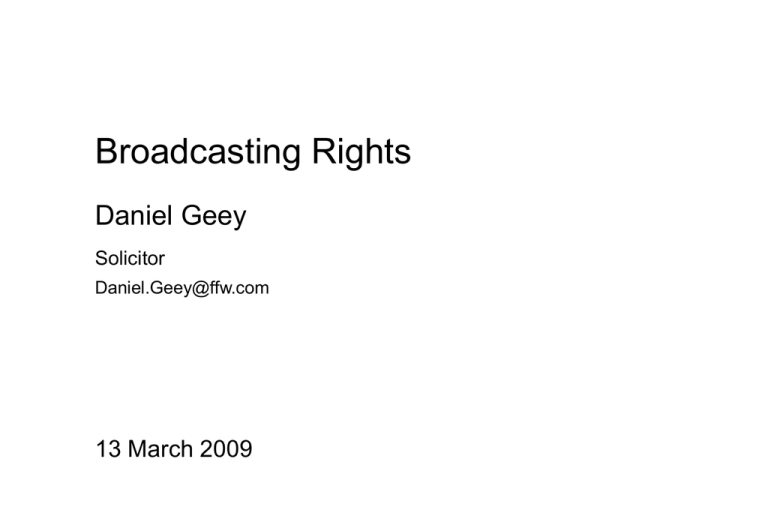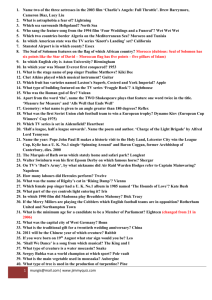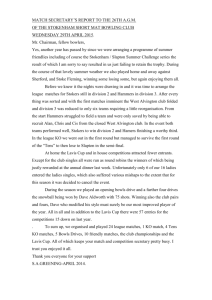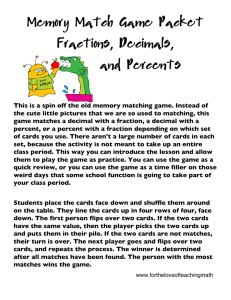Broadcasting Rights
advertisement

Broadcasting Rights Daniel Geey Solicitor Daniel.Geey@ffw.com 13 March 2009 Value of Recent Football Deals Competition Period Value (£millions) Details Champions League 2009 – 2012 405 Sky: £240m ITV: £165m FA Premier League 2007 – 2010 1,706 Sky: £1,314m; Setanta: £392m FA Premier League 2010 – 2013 1,782 Sky: £1,623m; Setanta: £159m FA Cup (+ England matches) 2008 – 2012 425 ITV: England home internationals, England away friendlies, FA Women’s Cup Final; Setanta: England home friendlies and away internationals, England women’s internationals, England U21 matches, Community Shield, Youth Cup, FA Trophy, FA Vase N.B. Breakdown of price paid not known Carling Cup 2009 – 2012 264 BBC: 10 Championship matches, Carling Cup both legs of both semi-finals and final; Sky: 65 Championship matches and all play-offs, Carling Cup – 2 matches from each round, both legs of both semi-finals and final. (+ Coca-Cola Championship) Broadcasting Assessment Market Definitions • RPC “..we think that it is putting it too high to say that there is no substitute for Premier League football so far as Pay-TV is concerned, for this underrates such football competitions as the FA Cup and the UEFA Champions League.” • MMC Report “…we do not see grounds for a wider definition involving the whole of football, as it does not seem credible to us that matches involving clubs drawn exclusively from divisions other than the Premier League would be acceptable substitutes...” • OFT ‘the Director finds that … the relevant markets are no wider than the wholesale and retail supply of channels containing sports content that is unique to pay TV. The content that he has identified as falling within this category during this investigation is live FAPL football’ • Ofcom Consultation (most recent) concurred with the MMC’s and OFT’s narrow market conclusions Ofcom found that there were only 48 matches featuring a PL team on FTA TV, compared with 174 on premium sports channels. As such, they felt that this was one of the reasons why matches on FTA TV were not sufficiently substitutable and were likely to lie outside its relevant market definition. Ofcom did, nonetheless, believe that the Champions League in particular, could fall within its market definition. Collectivity, Exclusivity and the RPC case • Collectivity is where a group of clubs act together to form a league, play in competitions and negotiate commercial deals as one entity. • PL acting as a cartel/monopoly. Italy returning to collective selling? • Exclusivity is the means by which a broadcaster can effectively guarantee large audiences for a popular product. By paying an exclusivity premium to the FAPL, broadcasters can ensure that consumers can only view the event through one medium. • Length of exclusivity- must no be too long otherwise market foreclosure unless new entrant E.g. Sky in 1992 RPC Case • OFT brought an action against the PL whom it considered acted as a cartel in collectively selling a small number of broadcasting matches whilst limiting supply for televised matches by exclusively selling broadcasting rights to one broadcaster. • Had the OFT been successful it would have • signalled the end of collective selling and possibly the redistribution of income in the Football League. • end of exclusive selling in the Premier League leading to individual clubs brokering deals with broadcasters (like in Spain) • Court was worried about the doomsday scenario, as it only had powers to rule the restrictions illegal or justify them. Strangely justified competition at 3-4 yearly intervals for one package costing £100m's as effective competition. • This meant very high barriers to entry for new entrants which the European Commission were concerned about. Commission 2001-05 Negotiations and Intervention • Commission still concerned with exclusivity. • 2004 broadcasting deal unbundled with 4 rights packages but Sky won them all. Commission unhappy. • Stipulation in the 2007 PL tender document that of the 6 packaged rights no broadcaster could win all six. 2007-10 Setanta got two. 2010-13 Setanta retained one. • Effects of packaging the rights- positive or negative- new entrant (now on brink of financial trouble) yet consumers paying for two subscriptions. • 2003-6 Champions League product packaged into smaller exclusive rights bundles with ITV and Sky have Article 81of the EC Treaty • ‘all agreements between undertakings…which may affect trade between member states and which have as their object or effect the prevention, restriction or distortion of competition within the common market.’ Premier League Broadcasting Cases • • There are currently two cases in which the PL is involved; they relate to Karen Murphy and QC Leisure. Mrs Murphy is a pub owner and QC Leisure is a stockist and supplier of foreign decoders to pubs and the general public in the UK. References have been made to the European Courts of Justice (ECJ) They argue that the PL’s contractual provisions restrict • • • • the ability of PL rights holding broadcasters to screen live pictures outside their own designated territory. the capacity of Mrs Murphy or QC Leisure to either view, or purchase decoders to view, live PL matches from any source other than the exclusive national PL rights holding broadcaster (i.e. Sky and Setanta can only broadcast their exclusive pictures in their allotted UK territory). The PL argues that the system of national Member State restrictions is needed to protect the value that is attached to their product and that the products’ live and exclusive characteristics create the value which has made the PL such a success story. Rights holders wishing to guard their valuable licensing and intellectual property rights versus European free movement legislation which in this instance safeguards European consumers’ right to purchase live PL matches from the cheapest provider in the EC. Current Climate • ITV and Setanta looking to renegotiate payment plans for FA Cup • Huge deal for the Premier League • Consumers happy to continue to pay for premium content? Listed Events Group A (Full Live Coverage Protected) • • • • • • • • • • The Olympic Games The FIFA World Cup Finals Tournament The European Football Championship Finals Tournament The FA Cup Final The Scottish FA Cup Final (in Scotland) The Grand National The Derby The Wimbledon Tennis Finals The Rugby League Challenge Cup Final The Rugby World Cup Final Group B (Secondary Coverage Protected) • • • • • • • • • Cricket Test Matches played in England Non-Finals play in the Wimbledon Tournament All Other Matches in the Rugby World Cup Finals Tournament Six Nations Rugby Tournament Matches Involving Home Countries The Commonwealth Games The World Athletics Championship The Cricket World Cup - the Final, Semi-finals and Matches Involving Home Nations' Teams The Ryder Cup The Open Golf Championship Listed Events II • • Jeremy Darroch, chief executive of UK pay-operator BSkyB, said that he will lobby for the abolition of listed-events legislation. He said that “It’s not for me to dictate to a rights holder how they should sell their rights. What we want is the chance to pitch and show what we can do to showcase their sport. There is no such thing as free sports coverage. We all pay our licence fee.” • Roger Mosey, head of sport at public-service broadcaster the BBC, defended the present free-to-air “crown jewels” list, which includes the Olympics, World Cups and European Championships. He said that “Pay-TV can hardly claim it's starved of good content by the current framework” and that if the list was reduced the UK would “lose an important part of our national life”. • A review of listed-events legislation is now being conducted by former English FA executive director David Davies. The process will include consultation with broadcasters, rights holders and the public, and is expected to report to the government by the second half of the year. UEFA and FIFA Challenges to the List • government's duty to safeguard certain sporting and cultural events (an artificial barrier to entry) v • having concern for business enterprise and the need for a competitive market in the sale of sports rights. • UEFA has challenged the European Commission’s decision to approve the listing of the entire UEFA European Championship Finals Tournament by the UK, whilst FIFA have challenged the listing of the entire 64 matches of the FIFA World Cup by both Belgium and the UK. Discussion Question • "Are rights holders wishes (such as the Premier League or UEFA) being listened too enough when regulating the European broadcasting market or conversely are consumers losing out in having to pay for more subscription based products that were once free to view?"





